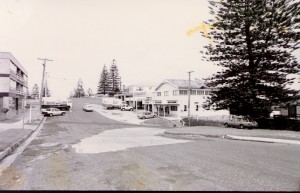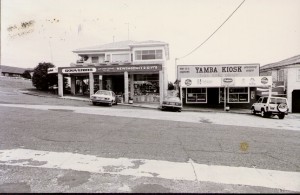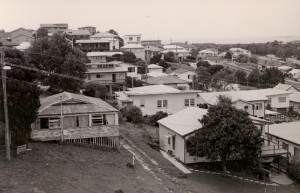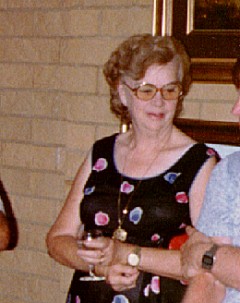
 |

Mary Sullivan Interviewee: Mary Sullivan, born 19XX Interviewer: Port of Yamba Historical Society members Date of Interview: 7 Feb 1992 Transcription: Marea Buist, 2001 |
(Break in Tape)... 'til now, the set backs the good and the bad. If you remember in the olden days there was Stan Brown's little place right down opposite the bowling club, this is getting back to after the war. And there was the Brown's, I think her name was Nell and they had a post office down there and a little shop that looked after everybody. And then you came down a bit and you came to the school and then further down the bus stop. There weren't very many things, there was just these odd ones here and there, the police station the bowling club and then Mrs. Thompson had a house in the main street on the corner. She had to have the bank in once a week and Teece's butcher shop was on the corner where the co-op butcher is now where the man use to waved the meat. And the Presbyterian Church was tangled in there somewhere and that with the bowling club was the main part of the town that existed that was it.
The water supply was a worry because after the war all you could depend on commercially was a well up there on the side of the hill near where the lighthouse is now and you never knew when it was going to run dry. You pumped the water from there into big cement tanks under any commercial building wherever it was. So that was a worry to start with.
 |
Roads were terrible, permanently terrible everything came up high street which is the narrow one and then Queen Street was only half a street up the road. Beach Street was much the same and Coldstream Street had never been formed. So they only had one road and that was the narrow one and everything was suppose to be at the top. The top had the hotel, 2 shops and the Convent, Craigmore and the Ritz boarding houses and the Church of England church. That church was a great worry to me when it was due to be moved, now that is skipping on a few years now but I will say something about it. I called a public meeting to save that church. We all knew that it had to be shifted. But I wanted it shifted down here in the park because it was beautifully made and it had a terribly amount of feeling about it. I think I must have had a 100 people at the meeting that night to shift the church and we guaranteed that it wouldn't cost anyone anything. We were going to do something about it our committee and they turned us down. They said it wasn't worth shifting which made me very mad because it was all tongued and grooved, it was beautifully made. It was really a classic. And I kept saying that it would make one of our best souvenirs for Yamba and what's more it would have been used. But no, nobody would... and I didn't think much of them.
We had a lot of problems of course with floods. If we had a flood we were completely cut off. If you wanted anything you got a boat and rowed across wherever the flooded areas were. One of the biggest floods ever was before we came here but some of them since then did me and I don't want anything bigger. We had no electricity, no radio the first one that happened. Bread, you could get flour and do something with it and everyone panicked of course like they do. But what was so bad was that we had quite a lot of tourist there and they would have been in the Ritz and Craigmore and the hotel and they would have people at home and properties at home no body could get anything. Electricity was out of action, the telephone was out of action and the roads were out of action and you couldn't get in. This year was around 1951 or somewhere around that but the people were going frantic about what was happening to them if they had property and with floods everywhere. The only thing we had in town was one man who had a battery wireless, just one-battery wireless in town and on it we got the whole news. We use to put it up on a plaque where everyone could see it what was the latest news. This poor man could get home with his battery and that went on for weeks, this first one that we had and I will never forget and the whole of the road system was blocked for 7 days and in came Quinney's bus this good old bus. It stopped in front of our place and unloaded the papers all 7 days of papers every paper from Brisbane, Sydney and wherever. And everybody wanted to know at once whether they could buy the paper and what happened to their people at home. It was terrible. All we could do was to open them up on the counter a week at a time, Monday, Tuesday, Wednesday... sort of thing and just let them have a go. There were two little boys up the front waiting patiently, they were the best of the lot. This great fellow came barging in and scattering everybody everywhere and came up to the counter and said "I wanted today's paper" and I said "we haven't got today's, sorry we have got everything else". He started to go cranky about it. So there was two fellows, and it was as funny as a circus standing there waiting basically. One each got beside his elbow and they just picked him up and put him down outside and I thought that this was British justice (laughing) and these two little boys were just standing there waiting for their paper.
Well then the town sort of got over all those things.
How did the tourist angle of it really get going?
Well it had a lot
of things against it because petrol was scarce, you couldn't get that
and incidentally this can go down in history, there was only one petrol
pump in town and that was in front of the kiosk up on the hill. There
was more soon as the others came but that was it and Freddie Phillips
put that in and it was the very first and the only one. But people seem
to come to Yamba to picnic. They loved camping on the headland at Christmas
time and holidays and that was really fairyland for anybody who was really
part of it who could get a tent site that was one of the greatest troubles.
They seemed to manage with the amenities that were there and every square
inch was booked and the Urban Committee use to collect a few fees.
But
it started off I believe it started off that particular section and the
way that happened started off this, well what should I say.. the goodness
and the publicity of saying - do you want to go to Yamba, it's so lovely
in the sea there and there doesn't seem to be any problems there and it
is very relaxed, and that is still going to this day. People come in even
now and say, "Oh, I love this place, I feel like I can rest and sleep
and it is so good for me." And I think a lot of that came from the
picnic feeling on the headland. The people up river use to get into their
cars when they had the petrol and bring the kids and they would have a
surf and do all sorts of things like that. Buy fish and chips and off
they went home. The trades people got behind it because Quinney's bus
was wonderful and we would have up to 12 or 14 buses coming in per Sunday
and that was a lot of people. They would all come and have a swim and
buy something and away they would go. Oh we were glad to see them go quite
frankly, the 14th one - it was good and it sort of gave us a different
sort of descriptive thing to the whole place because it was so sleepy
and so relaxed. So when it happened in the middle of the catastrophe when
the Ritz burnt down that sort of took about 20 places of accommodation
out of our hands. The camping then by that time had been realised on the
hill. The Urban Committee said that unless we put the campers down on
the Flat that nobody was going to come because the camping area was not
good enough and it could not be make good enough to keep up with the town's
growth. So amongst all sorts of rage it went down the bottom and the part
on top was kept for the casual people who wanted to pull up there and
see.

Where did they go at the bottom?
Down to Calypso, well it became Calypso. The people offered their homes when the Ritz was burnt down to tourists and to people through the agents that if they wanted a family they were quite prepared to do it. But running through the lot of it that I think has been Yamba's success has been the Surf Club because those Surf Club boys have kept the work going for so many years. Before I ever came here I use to see them at Port Macquarie. They kept the flag flying and the image. The bagpipes used to come down on Sunday lend a hand as well. And the Surf Club I could give full marks for the work of Fred Hall who kept it going and those boys that kept it going right through those long years of the war and then afterwards.
And years afterwards I sort of got to know this feeling of restfulness came through because we use to stock a lot of pottery in our place and it use to craze and I would send it back. So finally these people use to get sick and tired of me sending it back, so they sent some people up here to investigate and they told us that we had the highest level of salt on the coast. I would think that it is that salt in the atmosphere. We could never stock any pottery from that day on. You have probably heard of Sullivan & Griffiths they were the biggest makers and they finally said that there was no good sending any because it will only be twelve months and it will be crazed. So, it was not very long ago in the paper I saw also that this area up here on the north coast particularly in this area has a very high salt content. It is the visitors that seemed to say all the time that it is very relaxing and restful. So they are just a few of my thoughts about how it happened.
Craigmore people of course, and I don't need to tell you about the Craigmore Guesthouse and the Ritz was a real home from home. It was a full boarding and lodgings and you didn't have to worry about anybody else but after that went there seemed to be a push once we lost the Ritz. Everybody sort of got behind it and said well we have got to do something about this and bought places slowly, not fast but slowly. We just got to Yamba when Ager subdivision was opened. Billy Doughety had that other subdivision opened on the end of Yamba Street right out near Pippi. There were a lot of blocks everywhere between those two and houses sprung up everywhere. So that's seems to be the reason why, getting back to the reason why was the catastrophe over the Ritz and the very restfulness of the town that started it off and of course there is no holding it back.
We came to Yamba in 1946 and they were camping on the hill then, everywhere.
You must have noticed a tremendous change in the way the place took off with Developing then?
Yes we did. I bought this little book along. It is a very little rough book, my first little Real Estate Book, have a look at it. We started off with four flats in 1951. Jimmy Thompson's flats were down in Ocean Street and they are still there, still going happily and over the Christmas holidays top you would get would be 7 guineas a week for them. Fifteen shillings for cleaning and it is now $25. After the Christmas period in February 1952 it was 6 guineas mine must have been a bit better because they were 9 guineas.
 |
How many flats were on your books two years later?
Well, there was four then and two years later there was 7 in 1954. Then of course I had to get another book because they wouldn't fit in. In 1957 a good flat would be 15 guineas so it went up 100% in 6 years and now that same flat at Christmas would now be something like $300 a week 30 years later. But what amuses me is too is that cleaning use to be 12/6 and the electricity use to be 12/6 and now you don't worry about electricity as it all goes in together but the cleaning is $25.
When you first came here to Yamba your first business was on the Hill.
Yes, Freddie Phillip's owned the kiosk it had been closed down for 6 years of the war and he wasn't very well and he had the place on the corner so he shifted the place on the corner business into the building that had been closed down, that's the kiosk. We bought the kiosk outright and his business so that what happened there and we kept that for 6 years. In the interim we knew that it wasn't going to be big enough and so we bought the present one.
Did you run the newspaper shop in the new one.
Yes it was huge. There use to be a middle post right down the middle of the shop and we built the newsagency around the post in 1946 when we came here, just after the war. We could see that the place was far too small and we had to get out of it and we bought the new place and then we sold the old one. In the new one then of course we had plenty of space to go crazy and I had a good drapery section on one side with the agency on the other. We had women's dresses and all sorts of things in there and haberdashery, materials by the yard and anything you wanted I had because there was nobody else in town who was doing it. By 1962 there was shops starting off down the bottom and there was a smattering of people coming in and starting businesses.
Did people come in by punts to start businesses?
Well yes the punts were there. They were there a long time getting bridged and the buses still came over those punts..
Do you have any idea of the population of Yamba when you moved here in 1946?
Yes a wild guess would be about 800. That might not be exactly right but somewhere about that.
 |
You were then just Sullivan so when did you first become Scott-Smith & Sullivan?
My name was Scott-Smith to start with and because I had lot of connections during through the war as it was terribly hard getting stock that I had to use all your powers to getting stock to carry on.
How did the stock come to the shop. Did it come by road?
A lot of it came by boat. The carriers bought it from Maclean to Yamba, for a long long while that happened.
Why did it come all the way to Yamba by boat.
Because there was no where for it to unload. We had to get sugar and flour and everything like that from Sydney by boat so that why I the kept Scott-Smith in because it was well known.
Now have you sold your name?
No I never sold it but we allowed John Kent to use it because he bought the business. People come up the hill and ring on my bell and say can I have a flat. I had two yesterday and phone calls I am always getting phone calls. So that's why we stuck to Scott - Smiths and mum's name was Scott-Smith and she was a partner and so we acquired the Sullivan later. (laughing)
Who are you going to get in the shop next?
I would love to know. It's a bit pathetic when the town shifts but you got to accept it. We will advertise it and see. It is a big place so there are a lot of business that are not already in Yamba because they could not get bigger premises and as long as you find somebody who hasn't got to be in the main street well you are right. People like hairdressers and alike don't have to be in the main street. People are coming to them.
What about developments in the area Do people come and buy these large tracts of land and are they allow to develop. What is the law about that?
Well not large tracts of land really, most of Crystal Waters has been acquired bit by bit hasn't it. There are a few places that I would like to see developed and hasn't happened and is over behind Romiaka behind Pippi beach.
What about the future that you see for Yamba as far as extensions go. Do you see it purely as a tourist area, do you see any industrial development, or business of development in the main streets?
Oh yes, the development, is going, you don't really notice it out along Angourie Road where that business section that's there. You have to drive in around to see the amount of manufacturing that is in the industrial areas that's going ahead. There is a terrific amount of land that is going to be subdivided on the left-hand side of the road going to Maclean. The new road is a definite thing it is not just talk from Yamba to the bridge through the back. People say that it isn't going to happen well that is going to happen. It is to come into Coldstream Street and to go right through and it is about time they did some to the Oyster Channel Bridge anyway and they will put another bridge in there and leave that to come straight through. It won't go any further than Angourie road that's where it will end there. It has to come in somewhere. I haven't seen the map on the town side and that will mean the entrance into Yamba will be something special particularly if they do it right which they will I think. Our entrance into Yamba at the present time are very nice I was only thinking the other night with the lights and water and houses are all improving and the greenery's growing up.
Before I came to Yamba I didn't know the place other than knowing the nice colours that the surf club fellows wore when they came down to Port Macquarie. I made inquires then of what the future was of Yamba. I went to no ends not only me but Mum and Morris to find out. The report I got from the top boys was that in the last depression that there wasn't no person went bankrupt in the Clarence Valley and secondly it had the highest amount of fixed deposit in the area and I don't think that has changed any. I think that in ten years time you will find that you will hardly recognise this place because it has everything going for it, just everything and plenty of room, plenty of sea, plenty of area, it's a beautiful place, that's why I came. A lot of people have worked hard over the years to get it to this point and its all been good stuff so I think the future is quite secure.